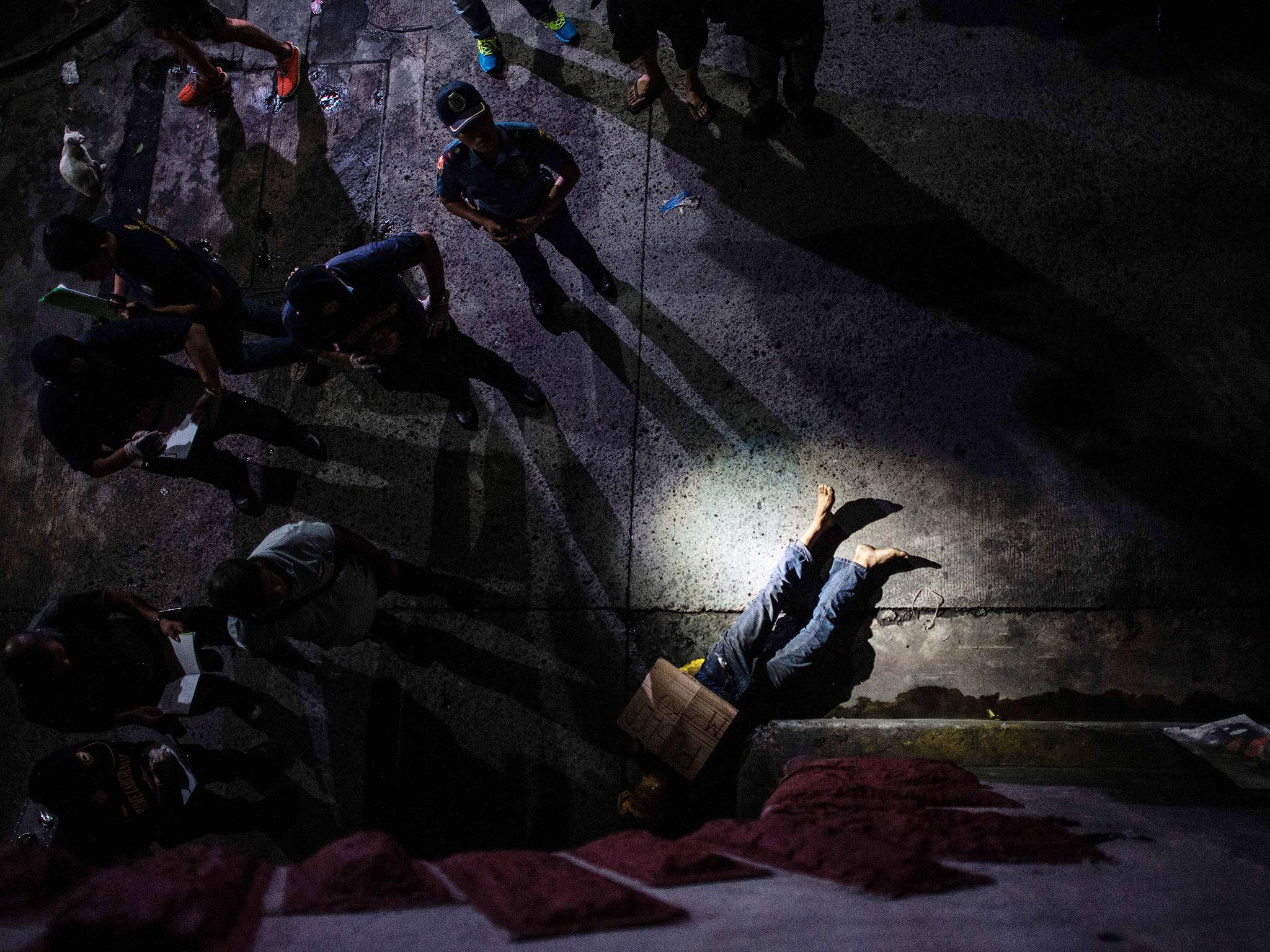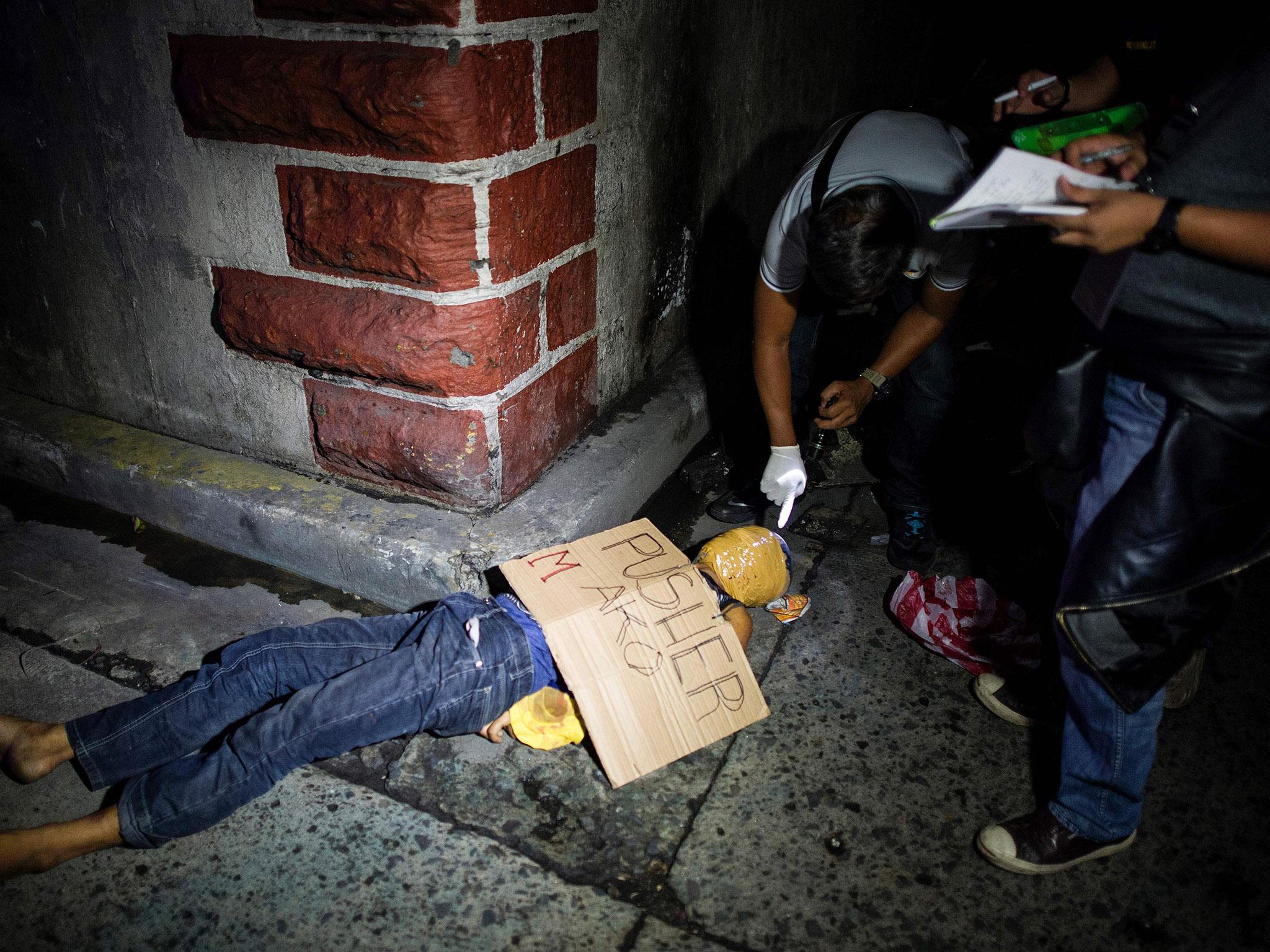Drug suspects murdered in Filipino President Duterte's war on crime
Civil rights campaigners including two legislators called for an inquiry into police operations amid concerns some of the dead suspects could have been summarily executed by lawmen

Your support helps us to tell the story
From reproductive rights to climate change to Big Tech, The Independent is on the ground when the story is developing. Whether it's investigating the financials of Elon Musk's pro-Trump PAC or producing our latest documentary, 'The A Word', which shines a light on the American women fighting for reproductive rights, we know how important it is to parse out the facts from the messaging.
At such a critical moment in US history, we need reporters on the ground. Your donation allows us to keep sending journalists to speak to both sides of the story.
The Independent is trusted by Americans across the entire political spectrum. And unlike many other quality news outlets, we choose not to lock Americans out of our reporting and analysis with paywalls. We believe quality journalism should be available to everyone, paid for by those who can afford it.
Your support makes all the difference.Filipino authorities say nine people have been killed in “anti-drug” attacks following President Rodrigo Duterte’s call on communist factions to kill drug traffickers and dealers.
One raid in the southern town of Matalam, about 900 kilometres south of Manila, left eight “drug personalities” dead on Saturday, including a woman, regional police spokesman Superintendent Romeo Galgo told Agence France-Presse.
In Manila, police found an unidentified dead man, his entire head wrapped in tape, on a poorly lit road late on Friday. His torso was covered with a cardboard sign reading: “I am a pusher.” Civil rights groups are demanding an investigation amid fears of summary executions.
The 71-year-old president, who built a reputation for tough anti-crime methods while mayor of the southern city of Davao, won the 9 May election overwhelmingly on a bold promise to end criminality and corruption in the first three to six months of his presidency.
This included a pledge to kill tens of thousands of drug dealers and other criminals – with the help of the authorities and the general public. The pledge has won him support but also sparked alarm among human rights groups. More than 100 suspects have been killed in the seven weeks since Mr Duterte’s election.

Civil rights campaigners including two legislators called on Friday for an inquiry into recent months’ police operations amid concerns at least some of the dead suspects could have been summarily executed by the lawmen. Police have said they had operated within the boundaries of the law in killing 103 suspects between 10 May and 7 July.
The Manila newspaper Philippine Daily Inquirer’s “kill list” of suspected criminals shows 119 victims of suspected summary killings up until 7 July, including 13 unidentified ones, since the elections.
Extrajudicial killings, torture, enforced disappearances, human trafficking and other human rights violations have decreased in the Philippines in recent years, but cases still exist and remain unsolved, according to Human Rights Watch.
“The Philippines authorities must urgently address the recent rise in killings of suspected drug criminals. Far from serving as a ‘quick-fix’, such killings violate both Philippines and international law, lead to the deaths of innocent people, and divert attention from long term measures that address crime effectively,” Rachel Chhoa-Howard, Amnesty International’s Philippines Researcher told the Independent.
“Suspects should be arrested, investigated, tried in a court which is the only authority allowed to mete out punishments. Allowing law enforcement officials to take the law into their own hands will deliver neither the justice people in the Philippines need, nor the security the authorities seek.”
Mr Duterte, a former prosecutor, has encouraged police and even ordinary citizens to shoot suspected drug dealers if they resist arrest and fight back, promising cash rewards if they turn in drug lords.

In recent weeks, dozens of suspected drug dealers have been killed in alleged gun battles with police or have turned up dead under mysterious circumstances, some with cardboard signs warning the public not to imitate the slain suspects.
Mr Duterte said there are many officials, Chinese nationals and police involved in the drug trade and suggested he would disclose their identities soon.
Last Friday the Philippines’ new police chief ordered officers linked to narcotics trafficking to surrender within 48 hours or be killed. And on Saturday Mr Duterte vowed to kill not only drug traffickers, but drug addicts.
“If I couldn’t convince you to stop, I’ll have you killed… if you’re into drugs, I’m very sorry. I’ll have to apologise to your family because you’ll surely get killed,” he said in a speech, adding: “The problem is once you’re addicted to shabu (methamphetamine), rehabilitation is no longer an option.”
Additional reporting by AP
Join our commenting forum
Join thought-provoking conversations, follow other Independent readers and see their replies
Comments